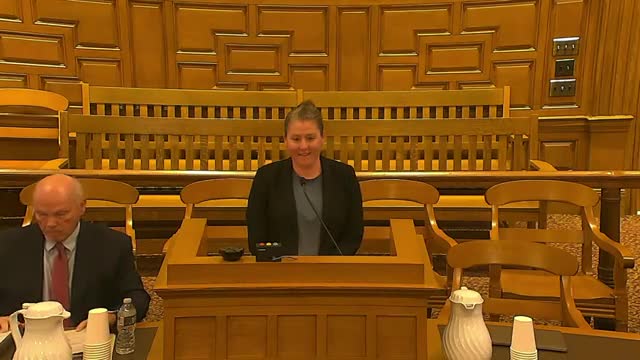Appeals court questions workplace accommodation, FMLA and retaliation claims in Massport firing
October 10, 2025 | Judicial - Appeals Court Oral Arguments, Judicial, Massachusetts
This article was created by AI summarizing key points discussed. AI makes mistakes, so for full details and context, please refer to the video of the full meeting. Please report any errors so we can fix them. Report an error »

The Massachusetts Appeals Court heard argument Oct. 10 in Captain Alexander Popolo v. Massachusetts Port Authority over claims that Massport denied a reasonable accommodation for a disability and later terminated him in retaliation for requesting leave.
Suzanne Herold, representing Captain Popolo, told the panel the core dispute is whether the accommodation granted by human resources—notification to colleagues and a response confirming assumption of command—was workable in practice. Popolo and his counsel said he attempted once to use the accommodation on an overnight shift, did not receive confirmation from relieving officers, and therefore did not feel able to leave. In interrogatory responses, Popolo reported making calls and not receiving responses; counsel said there were no phone logs or texts admitted into the record to corroborate those attempts.
Massport counsel Terrence McCord said the accommodation was granted without delay after Popolo requested it on Feb. 28, 2020, and an email on March 2, 2020, explained the procedure: notify the sergeant or lieutenant on duty and notify chiefs who would then “assume command.” McCord told the panel Popolo testified he never actually exercised the accommodation and that the department’s subsequent investigation and discipline—suspension in January 2020 and later termination in December 2020—were the result of misconduct and progressive discipline, including conduct captured on video.
Justices pressed both sides on timing and causal links. The panel asked whether a single attempt and a two‑month or later disciplinary sequence could, standing alone, create the causal nexus required for a retaliation claim under chapter 151B. McCord argued Massport offered the accommodation and that intervening events, including an internal investigation that produced video evidence of inappropriate conduct with a subordinate, broke any causal connection to accommodation requests or intermittent FMLA leave.
The court also questioned whether an FMLA application qualifies as protected activity under chapter 151B; counsel for Massport argued FMLA leave requests are not exercises of rights under chapter 151B itself. Counsel for Popolo relied on case law allowing temporal proximity to support an inference of causation and contended that the district court erred in finding no genuine issue of material fact.
After argument the panel took the case under advisement.
Suzanne Herold, representing Captain Popolo, told the panel the core dispute is whether the accommodation granted by human resources—notification to colleagues and a response confirming assumption of command—was workable in practice. Popolo and his counsel said he attempted once to use the accommodation on an overnight shift, did not receive confirmation from relieving officers, and therefore did not feel able to leave. In interrogatory responses, Popolo reported making calls and not receiving responses; counsel said there were no phone logs or texts admitted into the record to corroborate those attempts.
Massport counsel Terrence McCord said the accommodation was granted without delay after Popolo requested it on Feb. 28, 2020, and an email on March 2, 2020, explained the procedure: notify the sergeant or lieutenant on duty and notify chiefs who would then “assume command.” McCord told the panel Popolo testified he never actually exercised the accommodation and that the department’s subsequent investigation and discipline—suspension in January 2020 and later termination in December 2020—were the result of misconduct and progressive discipline, including conduct captured on video.
Justices pressed both sides on timing and causal links. The panel asked whether a single attempt and a two‑month or later disciplinary sequence could, standing alone, create the causal nexus required for a retaliation claim under chapter 151B. McCord argued Massport offered the accommodation and that intervening events, including an internal investigation that produced video evidence of inappropriate conduct with a subordinate, broke any causal connection to accommodation requests or intermittent FMLA leave.
The court also questioned whether an FMLA application qualifies as protected activity under chapter 151B; counsel for Massport argued FMLA leave requests are not exercises of rights under chapter 151B itself. Counsel for Popolo relied on case law allowing temporal proximity to support an inference of causation and contended that the district court erred in finding no genuine issue of material fact.
After argument the panel took the case under advisement.
View full meeting
This article is based on a recent meeting—watch the full video and explore the complete transcript for deeper insights into the discussion.
View full meeting
